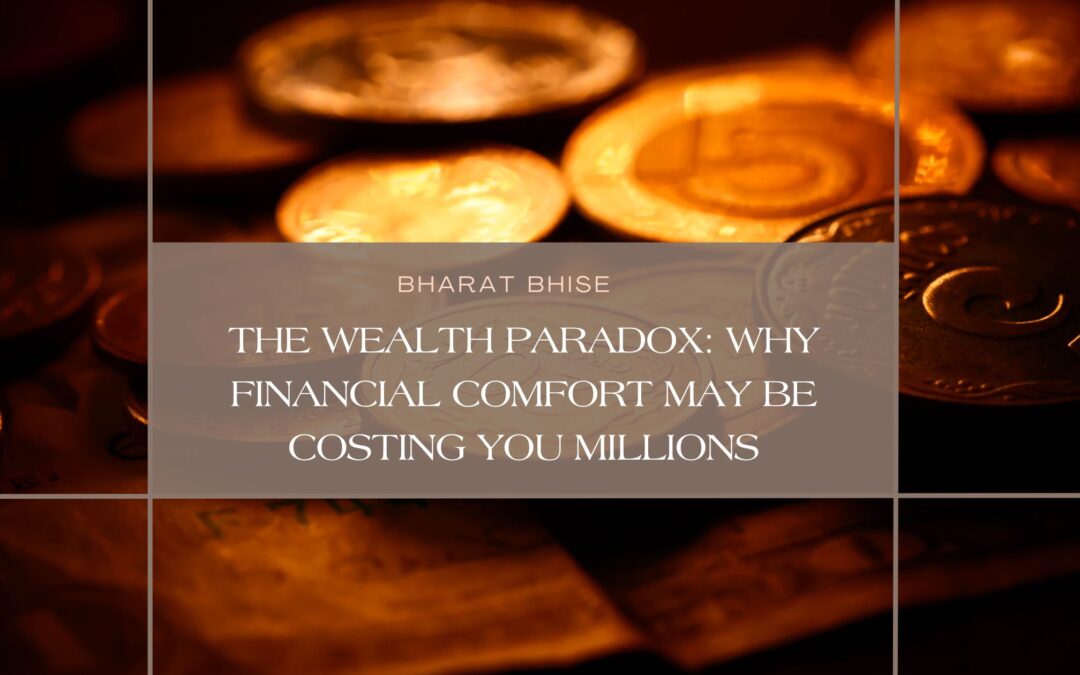There’s a peculiar phenomenon in personal finance that rarely gets discussed: the more financially comfortable you become, the more likely you are to miss significant wealth-building opportunities. This counterintuitive reality—what I call the Wealth Paradox—explains why many middle-class professionals plateau financially while others with similar incomes continue to build substantial wealth.
The Comfort Trap
Financial stability is, undoubtedly, a worthy goal. Having emergency funds, manageable debt, and steady income creates a foundation of security that was the dream of previous generations. Yet this very comfort often becomes a subtle trap, lulling us into financial behaviors that systematically limit wealth creation.
When we achieve basic financial stability, our relationship with money fundamentally changes. Risk tolerance decreases. Innovation stalls. The psychological urgency that drove earlier financial decisions dissipates. We begin maintaining rather than building, preserving rather than growing.
Consider two professionals earning identical $120,000 salaries. One, comfortable with her mortgage, retirement contributions, and lifestyle, focuses on preservation. The other, despite identical circumstances, maintains a growth mindset. Over 20 years, their financial trajectories diverge dramatically—often by millions—not because of income differences but because of how comfort shaped their financial decisions.
The Invisible Cost of Inaction
Financial mathematics reveals a sobering truth: the greatest expense in most people’s lives isn’t taxes, housing, or education—it’s opportunity cost. The investments not made, businesses not started, and risks not taken often represent more lost wealth than all other expenses combined.
This cost remains invisible on financial statements and budgets. No monthly bill arrives for opportunities missed. No annual statement tallies wealth that could have been created. This invisibility makes the Wealth Paradox particularly dangerous.
When market volatility strikes, the financially comfortable often retreat to safety—selling investments at market bottoms or passing on discounted assets. Meanwhile, those who maintain a growth mindset despite their comfort level recognize these moments as rare wealth-building opportunities.
Breaking the Paradox
Escaping the Wealth Paradox doesn’t require abandoning financial stability or taking reckless risks. Instead, it demands a deliberate mindset shift and strategic approach to growing wealth while maintaining security.
First, separate stability from growth in your financial planning. Establish clear parameters for what constitutes your financial safety net, then deliberately allocate resources beyond this threshold toward growth opportunities.
Second, create artificial financial pressure. Many wealthy individuals maintain a practice of “forcing” investment by automatically directing significant portions of income increases toward investments rather than lifestyle inflation.
Third, cultivate exposure to environments that expand your financial thinking. The financially comfortable often socialize exclusively with those at similar levels, reinforcing limiting beliefs about money. Deliberately seeking mentorship and community with those operating at higher financial levels can reveal opportunities invisible from your current perspective.
The Choice of Perspectives
Financial comfort isn’t inherently negative. The security it provides creates the foundation for calculated risk-taking and long-term wealth building. The key distinction lies in whether comfort becomes a destination or a platform for continued growth.
The Wealth Paradox presents a choice: Will your current financial comfort become the ceiling of your wealth, or will it serve as the floor for your next level of financial growth? The difference between these perspectives, compounded over decades, often separates those who achieve modest financial security from those who build enduring, generational wealth.
The greatest financial skill in our complex economy isn’t saving, investing, or even earning—it’s maintaining a growth mindset despite the seductive pull of financial comfort.

